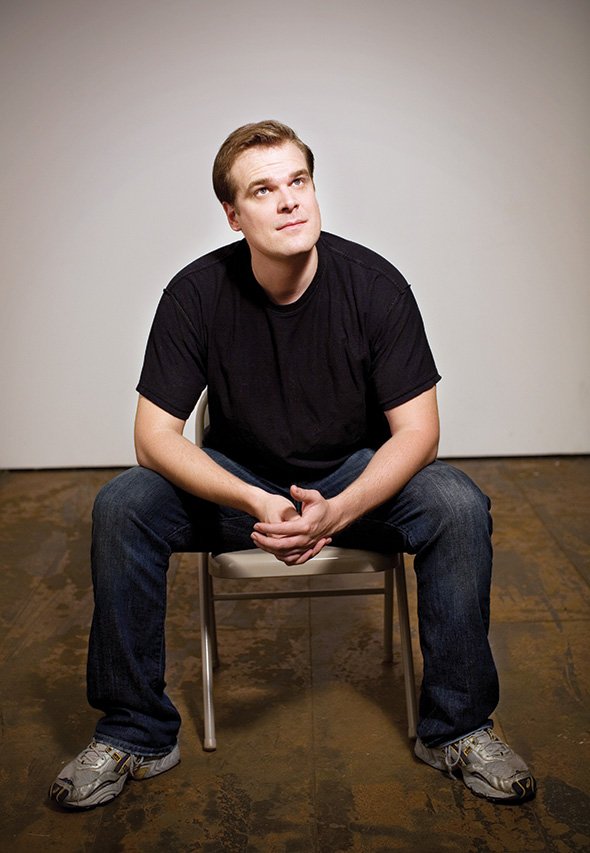
Quantum of Solace’s anti-Hollywood actor, David Harbour, acts like an adult.
I’m thinking about wearing a Hold Steady T-shirt to a couple of movie premieres,” says David Harbour, via telephone. “Maybe that will help the cause?” “The cause” is Harbour’s pending nuptials to Strangers With Candy’s Maria Thayer (Tammi Littlenut) for which he has single-mindedly decided his new favorite group, the abovementioned Hold Steady, should be the wedding band. Considering these premieres are going to be for the new Bond film, Quantum Of Solace; the latest Sam Mendes (American Beauty) project starring Leonardo DiCaprio and Kate Winslet, Revolutionary Road; and State Of Play with Russell Crowe and Ben Affleck, Hold Steady will be getting a lot of screen time—much like Harbour is.
The 33-year-old New York-based actor is not new to acting—even if his name doesn’t have the same resonance as those he is sharing screen and stage time with. Harbour has been sharpening his skills on Broadway and West End stages for the last few years. After working alongside Kyra Sedgwick and David Strathairn on Craig Lucas’ The Stranger, Harbour found himself part of the Tom Stoppard crew performing the plays The Invention Of Love and Coast Of Utopia, with Billy Crudup and Ethan Hawke. But it was Harbour’s take on the classic Edward Albee play, Who’s Afraid Of Virginia Woolf?, (where he shared the stage with Kathleen Turner and Bill Irwin) as “Nick,” that garnered him a Tony nomination.
“I had written a senior thesis on [Who’s Afraid Of Virginia Woolf?] in high school,” says Harbour. “I was fascinated by the character. I loved George Segal in the movie, but I thought there were things about Nick that he didn’t reveal. The first reading we did, I let loose and was very silly and ridiculous. [Albee] came up to me afterwards and said, ‘You’ve done readings of this before, haven’t you?’ And I said, ‘No sir, but I think you’re having a premonition that I’ll be doing it in the future.’ I think he thought, ‘What a punk this kid is. I should definitely give him the part.’”
Choosing to remain in New York rather than making the predictable move west, Harbour reveals a certain amount of angst about not being stereotypically Hollywood good looking enough to be on screen. Plus, his background is in theater, including time at a Maine summer stock company where he was part of a floating repertory for four Shakespeare plays performed within four days, one after the next, with two weeks rehearsal. Says Harbour, “It taught me to refine whatever method I had, to make fast, bold choices—grab something, and say it as clearly and powerfully as I could in a short amount of time. It was great training.”
From Shakespeare to Fleming, Harbour’s turn as Bond “baddie,” Gregg Beam, in the Mark Forrester-directed Quantum of Solace (which picks up one hour after its predecessor, Casino Royale) is in keeping with the post 9/11, Daniel Craig represented Bond where situations are more realistic, grittier, and scarier than classic Bond films. The juxtaposition of producers who are in tune with the Bond aesthetic and Forrester’s sensitive quirkiness adds an absurdity to Harbour’s character, which is interestingly fitting.
A connection to the director is also part of Harbour’s experience on Revolutionary Road where the fact that Mendes and Winslet are married, and Winslet and DiCaprio have a history together, created a family environment on set rather than alienating other cast members. In fact, Mendes tapped into Harbour’s latent sense of humor—which doesn’t get enough screen time—with their mutual love of the British The Office, “I can quote just about every line,” Harbour admits. “When they were setting up off camera [Mendes and I] would say The Office jokes to each other. Like on The Chris Farley Show, Wasn’t it great when they did that?”
With his tidal wave of Hollywood interest, Harbour feels staying in New York was, and is, the right decision for him. “I classify the world into two types: Romeos and Mercutios. Guys who get jobs in their 20s, Josh Hartnett and Jack Gyllenhall, are dreamy guys. I identify with guys like Jack Nicholson or Gene Hackman. I’ve always had the complexities of a man as opposed to a boy, someone with a little more cynicism and world-weariness. I was very awkward as a teenager, I was awkward in my 20s, and now that I’m hitting my 30s, I feel like I’m understanding life a little bit more. Even if I tried to do anything in Los Angeles in my 20s, I don’t think I would have been very successful. I’m drawn to the things that men have to deal with. Those roles aren’t available to you until you hit 35 or 40. I don’t think I’m coming into my own until then. This is really the
beginning for me.”
TEXT BY Lily Moayeri
PHOTOGRAPHY BY Jason Frank Rothenberg

